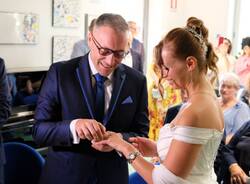“I’m leaving Italy for Nice, there’s no future here”
Giovanna Tissoni is a researcher at Insubria University. She studies “laser physics” and other cutting edge subjects in the scientific field; this talented scientist, from these parts, is escaping to France.
“My childhood dream was never to become a university researcher. It all happened by chance, during my graduation thesis. At that time, I discovered a passion for studying things in depth, for doing research. I then decided I would continue on that path.” But in Italy, that path has become one of the most difficult to follow. It is no surprise, then, that many decide to leave halfway, and choose another path to reach their destination. Like Giovanna Tissoni, a researcher at Como’s Insubria University site, who will shortly be finishing her work in Italy, and continuing it at Nice University. The path she has undertaken so far is typical: “I graduated in physics and then I did my doctorate at Milan University. First, I obtained a four-year-contract as a researcher for the National Research Centre, then as a university researcher. I’ve worked at the Faculty of Science in Como for ten years. Now, I’m considering my future and I can’t see any opportunities of growth.” As she herself confirms, the faculty where Dr. Tissoni works is full of talented people. For example, she is in charge of laser physics in the field of quantum optics, a cutting edge subject in the science field. But she is not the only one; just a few months ago, a colleague of hers, Professor Daniele Faccio, was in the international press thanks to his sensational demonstration of Hawking’s Black Hole Theory. However, Dr. Faccio is also not going to stay in Italy; the scientist has chosen the Scottish lochs over Lake Como.
But what spurs a person on to look for new opportunities, to leave everything, even though they know they have a lot to give to their country?
“It’s not only a financial choice, I’d like to make that clear,” said the researcher from Como. “In France, I’ll initially have the same position, and I don’t expect any great differences in terms of salary. What is most important is my future. With all the best will in the world, I couldn’t aspire to anything in Italy in the next few years. In Nice, I can expect a long-term career; furthermore, there are far fewer short-term contracts there. On the matter of leaving Italy, I have to say that I also had personal reasons to do it, so I had a number of reasons for doing so. The future of research in Italy is not encouraging.”
What do you think about the Gelmini reform, and what experience did you have of the researchers’ protest in the last few months?
“I should start by saying that a university career is not easy, and neither should it be. It has to be selective, but this doesn’t mean impossible. I think I’m an investment for my country, one that is built up a little at a time. But this isn’t acknowledged. There isn’t even the slightest planning for the future. Current regulations, and those planned, that govern the university inhibit a strategic approach. The freeze on recruitment and turnover, and the cuts in research funds are all limits that compromise our future. Universities are short of the money they need to work, for research, and for recruiting staff.”
It is natural, however, that a researcher should gain experience abroad; it is part of his training.
“Sure. But it should be just one way. Our system isn’t attractive. It prevents access to foreign brains. Of course, it’s natural for anyone that does research to move about, but nobody’s going to come from abroad to take my place when I’ve gone.”
Your faculty has great potential, so it should be seen as a strategic factor, for the country, as well. Do you agree?
“It’s a centre of excellence with extremely qualified people. But the fact that many are leaving should make us reflect in a broader way: the situation at Insubria is unusual, because it’s small, and the intention behind the Gelmini reform seems to be to make cuts in the small universities. I hope the Faculty of Science in Como can continue its work, because it’s full of people who deserve it.”
Did you also protest?
“Yes, with my colleagues, because I agree with the ways and the means of the protest. We only did what was allowed by our contracts. We said we weren’t available for teaching. It was the first real protest at our university, as because of this, in July, when the dissatisfaction was expressed, some deans and lecturers underestimated us. Today, even the associate professors have taken sides, and many of them have joined the protest.”
La community di VareseNews
Loro ne fanno già parte
Ultimi commenti
Giorgio Stucchi su Scuole Materne di Gallarate, scontro sulle rette e sulla “clausola aperta”
Mia23s su Esplosioni e fiamme in una fonderia a Lonate Pozzolo
Alberto Gelosia su Il tour per la legge sulla “Remigrazione” passa anche a Gallarate: interviene l’Anpi
Felice su In Svizzera si voterà per decidere se nel Paese debba esserci un tetto massimo di dieci milioni di abitanti
Felice su Superati i 3 milioni di presenze: turismo in crescita nel Varesotto e Varese Welcome lancia nuove idee
Felice su Malpensa e Superstrada blindate per le Olimpiadi: scatta la chiusura della 336
















Accedi o registrati per commentare questo articolo.
L'email è richiesta ma non verrà mostrata ai visitatori. Il contenuto di questo commento esprime il pensiero dell'autore e non rappresenta la linea editoriale di VareseNews.it, che rimane autonoma e indipendente. I messaggi inclusi nei commenti non sono testi giornalistici, ma post inviati dai singoli lettori che possono essere automaticamente pubblicati senza filtro preventivo. I commenti che includano uno o più link a siti esterni verranno rimossi in automatico dal sistema.